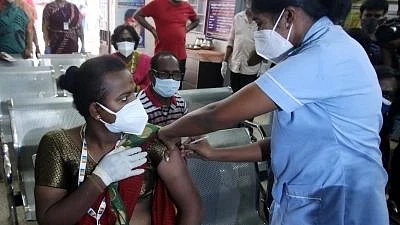The transgender community is among the worst hit during the pandemic and the subsequent lockdowns. Apart from struggling due to loss of income, the community faced stigma that jeopardised their access to relief and healthcare, finds a report. The community also faced direct discrimination by the police during the pandemic.
A report published by the Alternative Law Forum (ALF) - ‘Asserting Dignity in Times of COVID’, documented how the transgender community was mostly left out of relief measures initially. They had to file a Public Interest Litigation in Karnataka High Court in April 2020, to get relief from the state, the report notes.
No ID Proof, HIV Treatment Disrupted
The report found that one of the main hurdles in accessing healthcare was the insistence of ID proof, both by government and private relief workers, which most transgender persons did not have. Even when they took up relief initiatives, they were harassed and their movement severely restricted by the police during the lockdown, the report said.
Meanwhile, People Living with HIV (PLHIV) in the community had their ART (Antiretroviral Therapy) treatment cycles disrupted and faced several hurdles in accessing medicines. The lockdown pushed them into isolation, causing mental health issues, the report states.
Transgender activists who addressed a press conference in the last week of June, also said that many police personnel failed to understand the need for ART medicines. Because of this, many transgender persons were not allowed to move around in the city to reach government hospitals.
“The transgender community suffered a severe mental health crisis due to unemployment as well as forcible isolation from community support and the pressure to spend all of one’s time with family members who may not have been sympathetic to transgender people,” the report stated, adding that their inability to pay for mental health services meant that they often had to suffer a crisis of loneliness and depression.
‘Some Lives are Treated as More Important'
Challenging the state’s decision to impose lockdowns, the report contended that the move illustrated how “some lives are treated as more important and worthy of saving than others.”
With the outbreak of the novel coronavirus in March 2020, the central and state governments were constitutionally duty-bound to respond to the crisis with measures to protect and uphold the fundamental right of dignity, access to food and healthcare for all. “The state willfully ignored its constitutional duty and instead focused all energies on imposing a series of unplanned lockdowns,” the report said.
The pandemic disproportionately affected already vulnerable communities such as poor, informal sector workers, migrant workers, women, Dalits, Adivasis, the transgender community and the gender and sexual minorities.
According to the report, this disproportionate impact is owing to deeply rooted patriarchy, casteism, classism and injustice in the system.
The transgender community is estimated to contribute a significant amount of their labour to the informal sector. A study conducted by the Kerala Development Society on behalf of the National Human Rights Commission of India found that 96 percent of transgender persons are denied jobs and are forced to take up low paying work or carry out street-based work such as badhai (ritual blessing), sex work, and begging.
COVID-19 unraveled an unprecedented health crisis and livelihood crisis which was aggravated by the state imposition of a complete lockdown.
According to the report, while the impact of the health crisis has received extensive coverage, the impact on the life and livelihood crisis created by the lockdown on particularly marginalized communities has not received sustained attention in political circles. The effect of this decision was severe on members of the transgender community and sex workers who relied on street-based livelihood.
“The decision of lockdown was taken, based on the simple point that some sections of the labour elite could continue to work while ignoring the lived realities of over 90 percent of the Indian working population,” the report stated.
Unlock Phase: ‘Couldn’t You Have Died of Corona?’
When finally, the government began to ‘unlock’, the community continued to face discrimination. The income from sex work was still a trickle as people were ‘scared’. The "judgmental attitude and stigma" towards transgender persons and contempt had increased manifold and the community was subjected to contemptuous remarks indicating that they were responsible for the spread of COVID -19, the report found.
“Many young trans-women who started going out to public for Mankti, geared themselves with masks, gloves and socks. Yet, they were mercilessly humiliated by shopkeepers and public with statements like, Couldn’t you have died of corona?”, a trans-woman was quoted as saying.
Life, post the pandemic and in the slowly restarting economy, looks grim for community members given that no efforts have been made to dismantle the systems of oppression against them or generate livelihood. Their lives continue to be treated as expendable, identical to how they were treated during the pandemic, the report read.
The report, authored by activists Rumi Harish and Sunil Mohan recommended that the “state must actively move away from this discriminatory patriarchal notion of family and accept the alternative setup of families that gender, sexual minority and transgender groups function in, especially for schemes and policies that are made for their welfare.”
